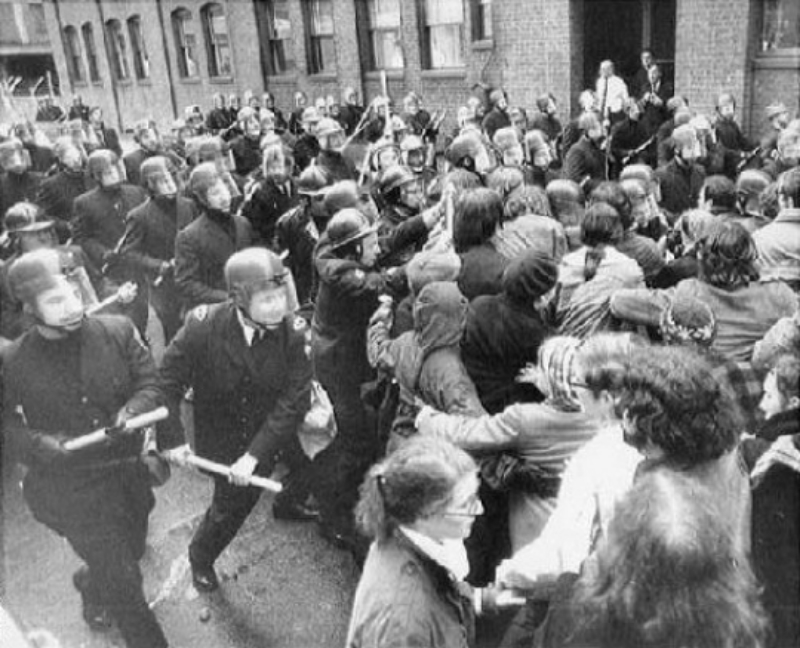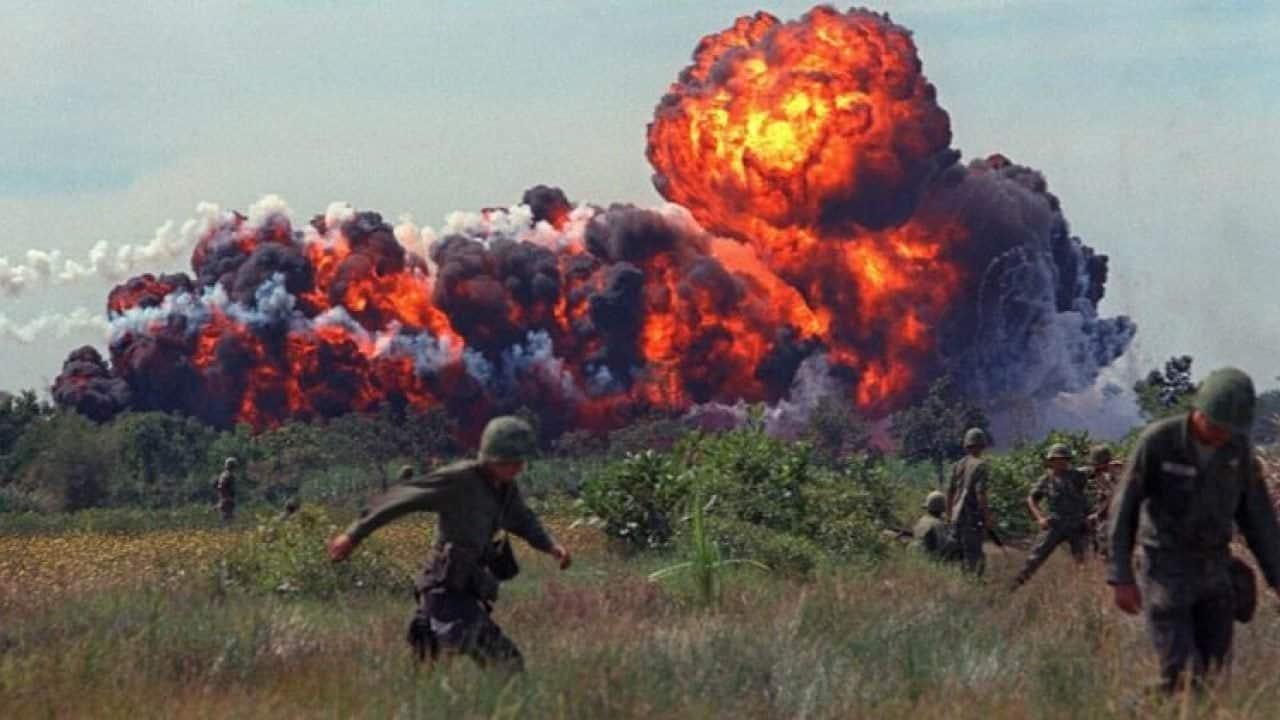The following links show the remarkable story of what happened when students at the centre of the US’s war research program decided to rebel.
NOAM CHOMSKY, WAR RESEARCH AND STUDENT PROTESTS AT MIT, 1967-1972
Chris Knight, Decoding Chomsky, science and revolutionary politics, Chapter 4.
Stuart W Leslie, The Cold War and American Science – the military-industrial complex at MIT and Stanford, Chapter 9.
Sarah Bridger, Scientists and the Ethics of Cold War Weapons Research, Chapter 3 & 4.
Noam Chomsky:
‘The responsibilities of intellectuals’, New York Review of Books, February 1967.
Letter in New York Review of Books, March 1967 – in which Chomsky says MIT’s ‘involvement in the war effort is tragic and indefensible.’
Letter in the New York Review of Books, April 1967 – in which Chomsky seems to change his mind saying ‘MIT as an institution has no involvement in the war effort.’
TV debate with Michel Foucault, 1971 – in which Chomsky says MIT ‘embodies very important libertarian values' but that he hoped his presence there helped ‘to increase student activism against a lot of things that MIT as an institution does.’
'MIT review panel on special laboratories final report', October 1969
– includes contributions by Noam Chomsky and Jon Kabat (now known as Jon Kabat-Zinn).
'Why smash MIT?', The Old Mole, November 1969
– in which radical students say: 'MIT isn’t a center for scientific and social research to serve humanity. It’s a part of the US war machine. Into MIT flow over $100 million a year in Pentagon research and development funds, making it the tenth largest Defense Department R&D contractor in the country. MIT’s purpose is to provide research, consulting services and trained personnel for the US government and the major corporations – research, services, and personnel which enable them to maintain their control over the people of the world. NAC’s (November Action Coalition’s) campaign was directed against MIT as an institution, against its central purpose.'
‘Special Report’, MIT Technology Review, December 1969.
– includes photos and a day-by-day account of the November Actions.

ACCOUNTS FROM MIT'S RADICAL STUDENTS
Stephen Shalom:
'A flawed political biography'
– a review of Robert Barsky, Noam Chomsky: a life of dissent.
George Katsiaficas:
'Prototype of radicalization'.
'Katsiaficas on ice'.
The Imagination of the New Left – a global analysis of 1968.
'Review of MIT president Howard Johnson's Holding the Center'.
'Comments on Decoding Chomsky'.
Michael Albert:
Remembering Tomorrow, Chapters 4-9 – in which Michael Albert describes MIT as another 'Dachau’ whose ‘victims burned in the fields of Vietnam’ (p9, 99).
‘From SDS to life after capitalism.’

ACCOUNTS FROM MIT'S NEWSPAPER, THE TECH
'SDS sits-in on Dow recruiter' , 7 November 1967. (Vol.87 Issue 43)
'Sala [army deserter] sanctuary established', 1 November 1968. (Vol.88 Issue 41)
'March 4 activities fill Kresge', 7 March 1969. (Vol.89 Issue 8)
See also 'Beyond March 4', the founding document of the Union of Concerned Scientists.
'Rostow defends [Vietnam] policies in Kresge confrontation', 11 April 1969. (Vol.89 Issue 15)
'Johnson confronted on I-Lab', 22 April 1969. (Vol.89 Issue 18)
– in which one student justified his determination to stop MIT's scientists doing military research by saying that 'one doesn't have the right to build gas chambers to kill people.' He went on to explain that 'the principle that people should not kill other people is more important than notions of freedom to do any kind of research one might want to undertake.'
‘150 students peacefully disrupt CIS’, 14 October 1969. (Vol.89 Issue 36)
Reports on the anti-war November Actions: 31 October and 4-6 November and 9 November 1969. (Vol.89 Issue 41-3)
'Noam Chomsky: a journey to North Vietnam', 5 May 1970. (Vol.90 Issue 23)
'Overkill', 15 September 1970 p5. (Vol.90 Issue 30)
'Krasner loses final appeal', 5 October 1971 p1,3,5. (Vol.90 Issue 37)
'Battering ram: the occupation of the president's office', 7 December p5 and 10 December p5 and 14 December 1971 p4. (Vol.91 Issue 53-5)
'MIT may be dangerous to the world', 28 April 1972 p5. (Vol.92 Issue 21)
'Riot police hit MIT campus', 12 May 1972. (Vol.92 Issue 25)
‘19 appeal trespass cases’, 4 August 1972 p1, 13. (Vol.92 Issue 28)


PHOTOS AND VIDEOS
MIT Museum 1960s/1970s student activism photographs.
MIT Center for International Studies: 'CIA origins' and 'Turbulent times'.

'November Actions'
– an extract from Ricky Leacock's documentary on MIT's student protests in 1969.

'Vietnam – the American holocaust' documentary, 2008.

TV debate between Noam Chomsky and William Buckley, 1969.
– in which Chomsky said, 'I assure you that I had nothing to do with keeping [Walt Rostow] out of MIT! I’d be delighted to have him back. He’s a great help to us when he’s around.' (Chomsky threatened to organise protests if Rostow was refused a job at MIT. Barsky p140-1.)
Walt Rostow, Henry Kissinger and President Lyndon B Johnson in the White House:



Students staging a protest against research into nuclear and other weapons at MIT in 1969/1970. (Jon Kabat is holding the megaphone.)

This sit-in appears to be in, or near, MIT’s Center for International Studies where academics were working with the US military on torture and assassination programmes in Vietnam. (Michael Albert, Remembering Tomorrow p99-101; The Tech, 14/10/69.)

This photograph shows the moment that students broke down the door to the office of the president of MIT, Howard Johnson. The students were protesting against the expulsion of the anti-war student president, Michael Albert. After this incident, as one MIT professor said, 'the faculty came down with a giant iron fist' and three students ended up serving prison sentences. (The Tech, 14/12/71)

















Comments
Here's some more pictures
Here's some more pictures from this period at MIT:
MIT students protecting an army deserter in 1968
Foliage penetrating radar set up by MIT scientists in South Vietnam, 1969
JEROME WIESNER: CHOMSKY'S
JEROME WIESNER: CHOMSKY'S BOSS
To give an idea of the kind of people who ran MIT in this period, here are some articles by, and about its Provost, Jerome Wiesner. (Wiesner was also the scientist who first employed Chomsky to work at MIT in 1955.)
'Electronics and the Missile', Astronautics, May 1958.
'Prof. Wiesner Explains', The Chicago Tribune, June 1969.
- In this article Wiesner says that he 'helped get the United States ballistic missile program established in the face of strong opposition from the civilian and military leaders of the Air Force and Department of Defense.' He goes on to say that he 'was also a proponent of the Polaris missile system, the ballistic missile early warning system, and the satellite reconnaissance systems.'
'A Secret Seminar', The New York Times, July 1971.
- This article exposed Wiesner's role in the Vietnam War.
'Interview with Jerome Wiesner', WGBH Media Library, March 1986.
- In this video, at 2mins., Wiesner states that he brought nuclear missile research to MIT in the 1950s.
The Gaither Committee, Eisenhower, and the Cold War, D.Snead, 1999.
- This book (on page 118) shows how, when Wiesner was on President Eisenhower's 1957 Gaither panel, he made the disingenuous claim that the Soviets 'could produce thousands of ICBMs [Intercontinental Ballistic Missiles] in the next few years.' By also 'urging that the Gaither committee base its conclusions and recommendations on that fact', Wiesner made yet another contribution to the terrifying nuclear weapons build up of the period.
Jerome Wiesner (right) confronted by a student protesting against the Reserve Officer's Training Corps (ROTC) at MIT, 2/6/72:

I was never a huge fan of
I was never a huge fan of Chomsky, but I never realized actually how hypocritical, and weirdly naiive, the dude is.
White House cabinet meeting
White House cabinet meeting during the Cuba Missile Crisis. Jerome Wiesner is second from the right with a pipe. A few weeks later, in December 1962, Wiesner advised President Kennedy 'to sell Polaris missiles, excluding warheads, at a cost of about $1 million each to the UK.'